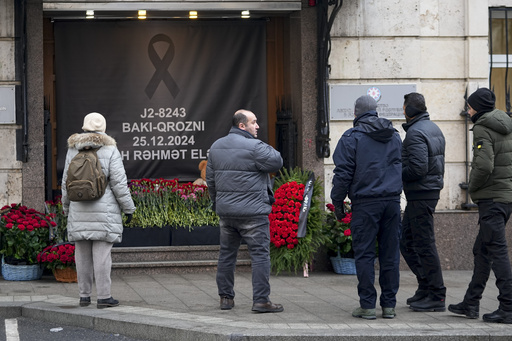Moscow – On Saturday, Russian President Vladimir Putin extended his apologies to Azerbaijani President Ilham Aliyev for a “tragic incident” concerning the recent crash of an Azerbaijani airliner in Kazakhstan, which resulted in 38 fatalities. However, he did not directly accept responsibility on behalf of Russia.
Putin’s remarks occurred amid growing accusations that the aircraft was shot down by Russian air defense systems, which were reportedly trying to intercept a Ukrainian drone strike near Grozny, the capital of Chechnya. An official statement from the Kremlin noted that air defenses were active around Grozny airport when the airliner attempted multiple landings on Wednesday, although it did not affirm that the defense systems hit the aircraft.
The Kremlin’s communication confirmed that President Putin expressed his regret to Aliyev for the incident taking place in Russian airspace. It also disclosed that a criminal investigation had been initiated into the crash, with Azerbaijani prosecutors traveling to Grozny to assist. Joint investigations by relevant authorities from Russia, Azerbaijan, and Kazakhstan are underway regarding the crash site located near Aktau in Kazakhstan.
The ill-fated plane had departed from Baku, Azerbaijan’s capital, heading for Grozny, but diverted toward Kazakhstan hundreds of miles away before ultimately crashing during a landing attempt. Of the passengers, 29 managed to survive the incident.
During a follow-up call, as reported by Aliyev’s press office, the Azerbaijani president informed Putin that the aircraft had experienced “external physical and technical interference,” although he refrained from directly attributing fault to Russian air defenses. Aliyev highlighted that multiple perforations were found in the plane’s fuselage and that the passengers suffered injuries from “foreign particles” entering the cabin during flight.
He also mentioned that an international team of experts had initiated an investigation into the occurrence at Azerbaijan’s urging, although specific information was not disclosed. Earlier that week, Azerbaijan’s Prosecutor General’s office confirmed that Azerbaijani investigators were present in Grozny.
In separate statements, a U.S. official and an Azerbaijani minister pushed the narrative that an external weapon caused the crash, a sentiment shared by aviation specialists attributing it to Russian air defense systems reacting to a Ukrainian drone attack. In response to a question regarding President Putin’s accountability for the incident, President Joe Biden commented that Putin “apparently did” acknowledge some responsibility, although he had not personally spoken with him at the time.
Survivors of the crash recounted loud sounds coming from the aircraft while it circled over Grozny. Dmitry Yadrov, head of Russia’s civil aviation authority, explained that the airplane’s crew was preparing to land in heavy fog when Ukrainian drones targeted the area, leading to a closure of air traffic. After failing to land twice, the captain opted to direct the flight toward Aktau.
Earlier this week, Rosaviatsia noted preliminary evidence suggesting that a bird strike may have led to the emergency situation on board the flight. Following the crash, Azerbaijan Airlines attributed the incident to “physical and technical interference” while suspending flights to multiple Russian airports without providing further clarification about the nature of the interference.
Should investigations confirm that the aircraft was hit by Russian fire, it would mark the second fatal incident involving civil aviation connected to the Ukraine conflict, reminiscent of the downing of Malaysia Airlines Flight 17 in 2014 by a Russian surface-to-air missile, killing all 298 individuals on board. Although Russia denied responsibility for that incident, a Dutch court convicted two Russians and a pro-Russian Ukrainian in 2022 for their involvement using a missile system obtained from Russia.
In light of the recent tragedy, Azerbaijan Airlines has suspended flights from Baku to Grozny and nearby Makhachkala, expanding its cancellation to eight additional Russian cities on Friday. Other airlines have followed suit, as Kazakhstan’s Qazaq Air announced a month-long halt on flights from Astana to Yekaterinburg. Meanwhile, Turkmenistan Airlines temporarily ceased its services to Moscow, and Israel’s El Al halted its flights from Tel Aviv to the Russian capital due to safety concerns regarding developments in Russian airspace.
